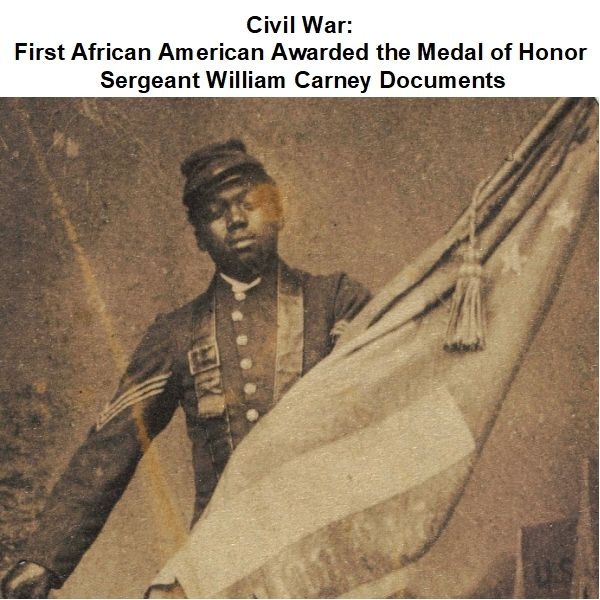
Civil War: First African American Awarded the Medal of Honor: Sergeant William Carney Documents
$1.90
Description
William Harvey Carney: Fort Wagner Hero
- February 29, 1840: William Harvey Carney is born into slavery in Norfolk, Virginia.
- Prior to March 1863: Carney’s family gains freedom and relocates to Massachusetts.
- March 1863: William Harvey Carney joins the 54th Massachusetts Volunteer Infantry as a sergeant.
- July 18, 1863: Sergeant William Carney participates in the assault on Fort Wagner in Charleston, South Carolina. During this action, he performs the heroic deeds that would later merit the Medal of Honor, including grasping the Union flag after the color sergeant was shot, leading the way to the parapet, planting the colors, and bringing the flag back under heavy fire despite being severely wounded twice (including a shot to the thigh). This is the earliest action deemed to merit the Medal of Honor among African American recipients.
- 1890: William Carney becomes a founding vice president of the New Bedford Branch 18 of the National Association of Letter Carriers.
- 1891: Luis F. Emilio publishes “History of the Fifty-Fourth Regiment of Massachusetts Volunteer Infantry, 1863-1865,” which includes coverage of Carney and the assault on Fort Wagner.
- May 23, 1900: Sergeant William Harvey Carney is awarded the Medal of Honor for his “extraordinary heroism” at Fort Wagner on July 18, 1863.
- 1901: The song “Boys the Old Flag Never Touched the Ground,” written by Bob Cole, James Weldon Johnson, and J. Rosamond Johnson, is performed in their Broadway musical “Shoo Fly Regiment.”
- December 9, 1908: William Harvey Carney dies.
- 1909: Shortly after Carney’s death, the song sheet for “Boys the Old Flag Never Touched the Ground” is published, memorializing his daring exploits.
Cast of Characters
- Sergeant William Harvey Carney (February 29, 1840 – December 9, 1908): Born into slavery in Virginia, he gained freedom with his family and moved to Massachusetts. He joined the 54th Massachusetts Volunteer Infantry in March 1863. Carney is renowned for his extraordinary heroism during the July 18, 1863, assault on Fort Wagner, where he bravely carried and protected the Union flag despite severe wounds. His actions were the earliest among African American soldiers to merit the Medal of Honor, which he received on May 23, 1900. After his military service, he worked maintaining city streetlights and then as a mail carrier for 32 years, also helping to found a local branch of the National Association of Letter Carriers.
- Luis F. Emilio: Author of “History of the Fifty-Fourth Regiment of Massachusetts Volunteer Infantry, 1863-1865,” published in 1891. He served with the 54th Massachusetts throughout its existence during the Civil War and survived the assault on Fort Wagner, providing a firsthand account that includes Carney’s actions.
- Bob Cole: One of the writers of the song “Boys the Old Flag Never Touched the Ground,” which celebrated Carney’s heroism. He co-wrote the song for the Broadway musical “Shoo Fly Regiment” in 1901.
- James Weldon Johnson: One of the writers of the song “Boys the Old Flag Never Touched the Ground.” He co-wrote the song with Bob Cole and J. Rosamond Johnson.
- J. Rosamond Johnson: One of the writers of the song “Boys the Old Flag Never Touched the Ground.” He co-wrote the song with Bob Cole and James Weldon Johnson.
Civil War: First African American Awarded the Medal of Honor: Sergeant William Carney Documents
William Harvey Carney (February 29, 1840 – December 9, 1908) was born into slavery in Norfolk, Virginia, in 1840. His family eventually gained freedom and moved to Massachusetts. Carney joined the 54th Massachusetts Volunteer Infantry in March 1863 as a sergeant. He took part in the July 18, 1863, assault on Fort Wagner in Charleston, South Carolina.
Sergeant William Carney of New Bedford, MA, became the first African American to perform action deemed to merit the Medal of Honor for “most distinguished gallantry in action” during the 54th Massachusetts Infantry’s assault on Fort Wagner, South Carolina, on July 18, 1863. After being shot in the thigh, Carney crawled on his knees, bearing the Union flag.
On May 23, 1900 Sergeant William Harvey Carney was awarded his Nation’s highest award, the Medal of Honor. Though by that time several other black Americans had already received the award for heroism during the Civil War and the Indian Campaigns, Sergeant Carney’s action at Fort Wagner on July 18, 1863 was the earliest deemed to merit the award.
His citation reads, ‘The President of the United States of America, in the name of Congress, takes pleasure in presenting the Medal of Honor to Sergeant William Harvey Carney, United States Army, for extraordinary heroism on 18 July 1863, while serving with Company C, 54th Massachusetts Colored Infantry, in action at Fort Wagner, South Carolina. When the color sergeant was shot down, Sergeant Carney grasped the flag, led the way to the parapet, and planted the colors thereon. When the troops fell back, he brought off the flag, under a fierce fire in which he was twice severely wounded.’
Carney received his Medal of Honor on May 23, 1900, nearly 37 years after the events at Fort Wagner (more than half of such awards from the Civil War were presented 20 or more years after the fact) Twenty African American men received the medal before him, but because his battle actions happened earlier than the others, he is often regarded as the first.
After his discharge, Carney returned to New Bedford, Massachusetts, and took a job maintaining the city’s streetlights. He then delivered mail for thirty-two years. He was a founding vice president of the New Bedford Branch 18 of the National Association of Letter Carriers in 1890.
Documents Include:
Congressional Medal of Honor File of Sergeant William H. Carney, Company C, 54th Massachusetts Infantry Regiment (U.S. Colored Troops)
This file contains information concerning the awarding of a Congressional Medal of Honor to Sergeant William H. Carney of Company C, 54th Massachusetts Colored Infantry for action on July 18, 1863, at Fort Wagner, South Carolina
Excerpts from “History of the Fifty-Fourth Regiment of Massachusetts Volunteer Infantry, 1863-1865,” by Luis F. Emilio (1891)
Excerpts from Luis F. Emilio history of Fifty-Fourth Regiment of Massachusetts Volunteer Infantry covering Carney and the Assault on Ft. Wagner. Emilio served with the 54th during its entire existence during the Civil War. He survived the assault on Fort Wagner.
Song Sheet – Boys the Old Flag Never Touched the Ground
In 1909, shortly after his death, this song sheet was published about his daring exploits. The song was entitled, “Boys the Old Flag Never Touched the Ground.” The song was written in 1901 by Bob Cole, James Weldon Johnson, and J. Rosamond Johnson and was sung in their Broadway musical “Shoo Fly Regiment.”
Related products
-
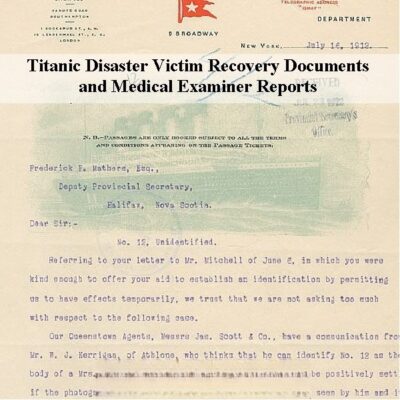
Titanic Disaster Victim Recovery and Medical Examiner Records
$19.50 Add to Cart -
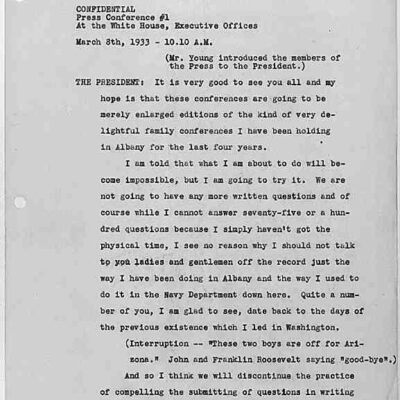
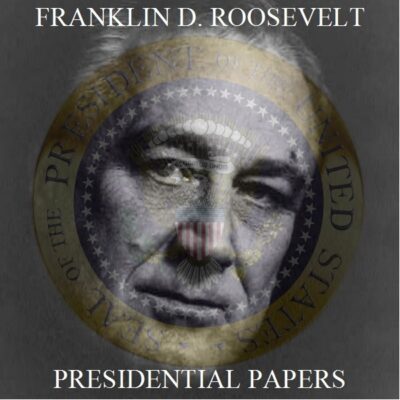
Franklin D. Roosevelt Presidential Papers
$19.50 Add to Cart -
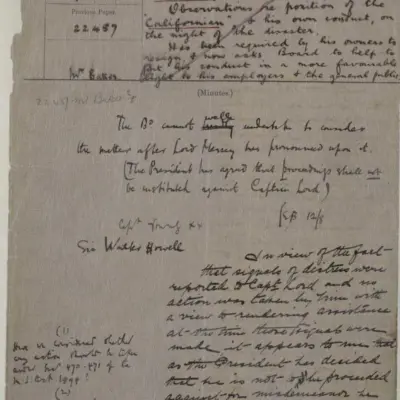

Titanic Disaster British National Archives Documents
$19.50 Add to Cart -
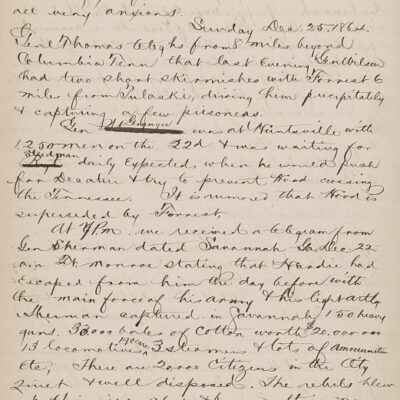
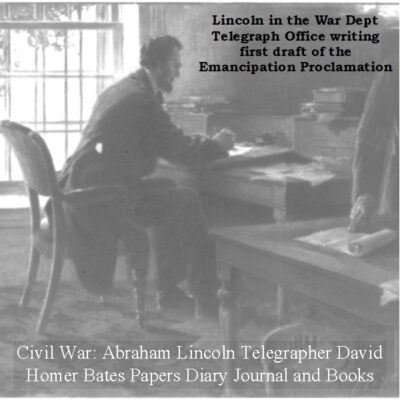
Abraham Lincoln’s Telegrapher David Homer Bates: Papers, Diary, and Books
$19.50 Add to Cart